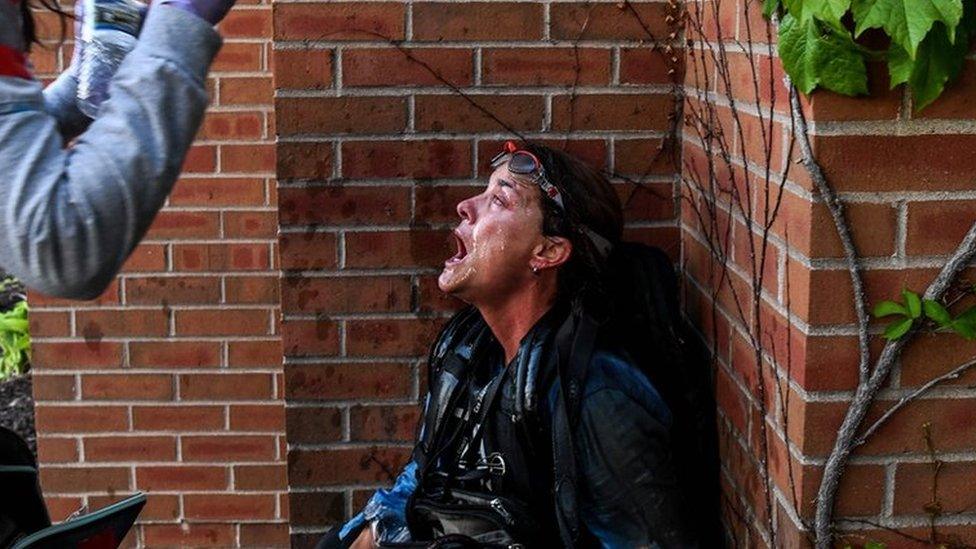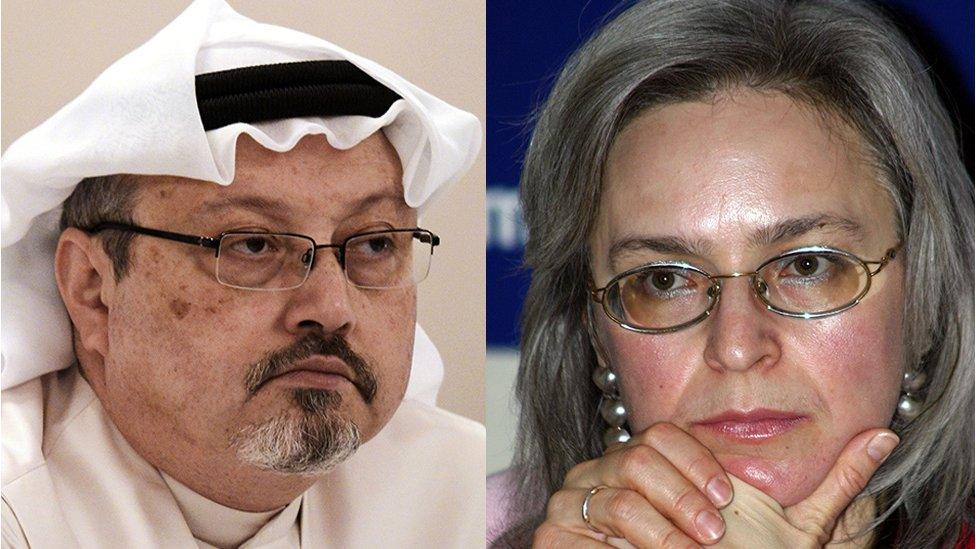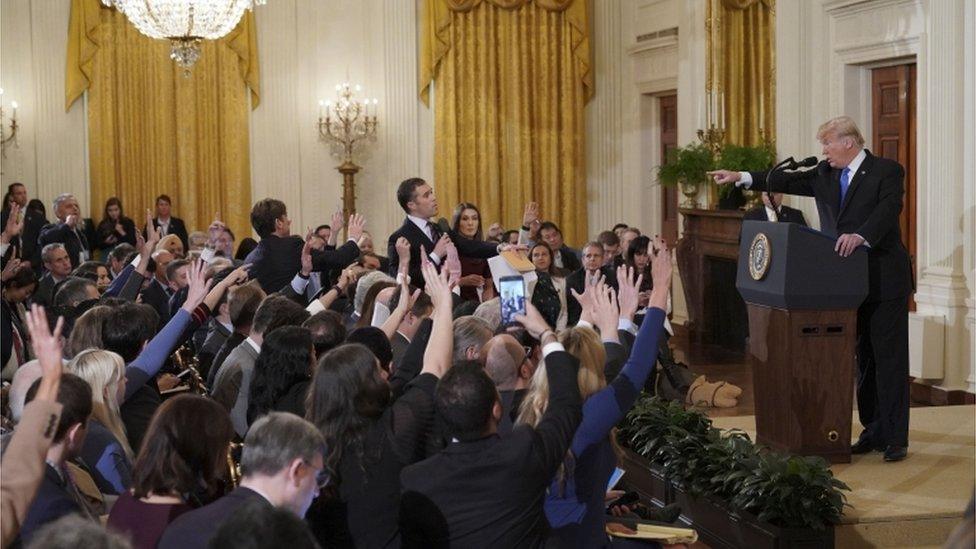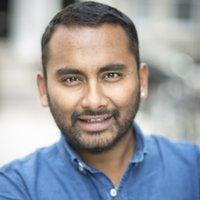What journalist-haters get wrong
- Published

Journalists from across the US have reported being targeted by police at protests
Across the world today, journalists are under sustained attack.
We know a lot more about it, as we know about the death of George Floyd, because of smartphones. When I say attack, I don't mean the broad ways in which their trade has been undermined, or their daily lives made more difficult, for example by the digital destruction of many traditional business models.
When I say attack, I mean punched, beaten, bloodied and killed. For doing their job.
Jamal Khashoggi is one of the most high-profile victims of recent years, murdered and mutilated for having the temerity to point out, on more than one occasion, that the House of Saud has not been a historic champion of universal human rights.
Further back, but still very much within living memory, Anna Politkovskaya was killed for daring to get close to the truth about the modern Russian state, not least its activities in Chechnya.

Journalists Jamal Khashoggi and Anna Politkovskaya were both murdered
Just this week, we have seen a grim escalation, as protests and riots in response to Floyd's killing tear at the fabric of America. The attacks on journalists have been led by the US President, who has regularly cast them as "enemy of the people".
On Saturday night, police in Minneapolis shot rubber bullets at two members of a Reuters crew in Minneapolis. Cameraman Julio-Cesar Chavez said: "A police officer that I'm filming turns around and points his rubber-bullet rifle straight at me."
Radio reporter Adolfo Guzman-Lopez took a rubber bullet to his throat., external
Yesterday, live on Australian television, external, a cameraman was punched near the White House. Footage from a different angle, external clearly shows he displayed no aggression toward the police officer who used the edge of a police shield to hit the cameraman's stomach before punching the lens.
A few days ago, my very distinguished colleague Pete Murtaugh was charged at, external by police officers, not far from the White House. The BBC's Paul Danahar, who runs the BBC News' bureaux across the Americas, was right to say that Peter was "clearly identifiable as a member of the media". The camera is always a giveaway, you see.
Danahar went on: "The team had been following all directions from the police as they covered the protests in front of the White House. The assault took place even before the curfew had been imposed, and happened without warning or provocation."
A BBC cameraman was charged by a police officer at a Washington DC protest
It must be exceptionally tough for police officers trying to uphold law and order. That said, in each of the cases I have mentioned, the journalist was probably identifiable as a member of the media.
And as for Pete Murtaugh, you've never heard of him, have you? Well, here's your moment. He's a father of three, universally adored in the BBC's Washington bureau, and widely regarded as one of the outstanding news cameramen of his generation. He lives just outside the city, and is an exceptionally kind and smart bloke.
A few years ago, when I door-stepped Rupert Murdoch outside his office in New York, a lot of people got in touch to say well done (often from within his company, as it happens). But the credit wasn't mine. It was almost all Pete's.
I had been looking the other way, facing the camera, when eagle-eyed Pete looked in the distance and saw him coming out of the office. He shouted, "It's Murdoch!". For some reason, despite being in New York specifically to cover a story about Rupert Murdoch, something about Pete's accent, and my misspent youth, made me think, 'Why has he suddenly brought up the A Team?'. But that's a story for another day.
Between them, Pete and my magnificent producer colleague Elizabeth Needham-Bennett, got us in position to ask the questions.
I had the easiest job of the lot, saying mere words. Look at the clip of that moment: you can clearly see Pete's reflection in Murdoch's car window. My job was to articulate a few sentences. Pete's job was infinitely harder: running with a very heavy camera on his shoulder; adjusting the focus and light exposure; and constantly and instantly responding to my movements and that of Murdoch's driver and security personnel - while keeping the shot tight.
Most people could ask Rupert Murdoch some questions on a Manhattan Street. How many could do what Pete Murtaugh did that day, let alone as well as he did? One in 10,000?
It's a skill, and that's why we call it a trade, and camera men and women are as much part of the trade as reporters are. In fact, to my mind, they're more important.
If you're lucky in news broadcasting, you get to work in teams of three: reporter, producer, camera operator. The reporter is the one who often gets the credit, and is always the best paid. But if the reporter wasn't there, and the camera operator was, you'd still have pictures for the news. Whereas if the camera man or woman wasn't there, you'd have nothing.
The single biggest and most frequent mistake made by those currently attacking journalists as enemies of the people is the tendency to react emotionally to some provocation by a high-profile journalist by impugning the whole trade. It's as if, in the minds of these journalist-haters, one famous anchor is by default an ambassador for the millions of people who work in the trade around the world.
This is how fame distorts. It gives a false picture to many people of what - and, crucially, who - constitutes journalism.
Naturally, President Trump isn't representative of public opinion, but you can see him make this conflation often. When he didn't like a line of questioning by CNN's Jim Acosta, he would attack him - and then by extension CNN.

President Trump points at CNN's Jim Acosta during a media briefing in 2018
When he didn't like a line of questioning, external by NBC's Peter Alexander, he didn't just attack Alexander, but NBC and Comcast, which owns it.
You see this in many of the attacks against the BBC. Of course, a huge number of criticisms of the BBC are entirely valid and necessary. Moreover, modern media has countless failings, many of them accentuated in recent years by social media. That's why the media these days is so often the story itself.
But the species of criticism which begins from disapproval of what one well-paid, high-profile figure says on a particular occasion, to eviscerate the whole organisation, as if that one person represents more than 20,000 others, is sloppy.
Journalism, as I have said elsewhere, is a noble trade whose higher callings are to inform the citizenry, apply scrutiny to power, and enlighten a culture, by spreading ideas and ideals.
Cameramen and women, and producers and sub-editors and fact-checkers, all contribute to this effort. Most of them are not famous. In fact, most people in journalism - though obviously not all - are decent, civilised, public-spirited people who enjoy elegant sentences, could get paid better elsewhere, and are in it more to scratch an itch for information than adulation.
They are local reporters knocking on doors to make sure silenced voices are heard, or sitting in tedious council meetings to ensure bureaucrats don't get away with deceit, or fixing interviews with people who want to contribute to a phone-in. In their small way, all these courses of human action fortify the collective effort of the trade.
What, after all, are camera operators who chronicle the unrest in America today doing, if not informing the citizenry, and so helping to apply scrutiny to power? The work is vital, the danger growing; and the reward often smaller than you think, financially at least.
They also, I can report, have a preference not to be targeted by democratically elected leaders - or punched in the face. Is that too much to ask?
If you're interested in issues such as these, please follow me on Twitter, external or Facebook, external; and also please subscribe to The Media Show podcast, external from Radio 4.
